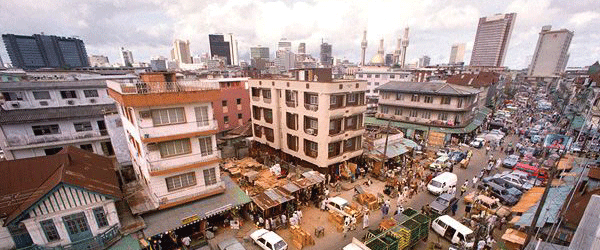Koter Offers Expertise on Nigerian Current Affairs

Professor of Political Science describes the current security, economic and developmental challenges in Nigeria and offers solutions to improve domestic and foreign relations.
Assistant Professor of Political Science Dominika Koter reflected on Nigerian current affairs on Thursday, February 2. Koter’s talk was sponsored by the Africana and Latin America Program’s annual brown bag series in The African, Latin, Asian, and Native American (ALANA) Cultural Center. A number of students who attended the event are members of the Model African Union, a research-based ALST program, who will be representing Nigeria at an upcoming conference from February 23 to February 26 in Washington, D.C.
Koter drew from personal, on-the-ground experiences in West Africa, and shared her perspective on some of the strengths and weaknesses that exist in present day Nigeria.
Koter discussed how Nigeria is known as the West African “giant,” not only because Nigeria composes one half of the region, but also because it recently surpassed South Africa as the continent’s most thriving economy. Koter explained that while Nigeria is a large and important African state, the country has room to improve its leadership position in relation to its neighboring nations in order to bring more stability to the region. She discussed two main objectives for Nigeria moving forward: increasing regional integration and increasing national security.
Koter explained the importance of regional integration, underlining how the lack of collaboration with different West African nations has resulted in a negative effect on trade and failure of states to meet their respective economic potential. Poor transportation infrastructure, as well as a lack of airlines that travel between these nations, further prevents regional integration.
Koter also explained how security issues have stymied Nigeria’s ability to assume its role as a regional hegemon. The country has been facing challenges internally and externally. The terrorist group Boko Haram, based in the Northeastern part of the country, continues to be a source of major ongoing security issues.
According to Koter, the lack of regional cooperation, resulting in failure of neighboring nations to enforce strong borders, has allowed the group to cross national borders with relative ease.
“[Boko Haram] is a recent phenomenon of these security issues,” Koter said.
During the talk, corruption and violence emerged as two pressing examples of security threats existing within Nigeria. Accusations of violent activity carried out by the Nigerian military against citizens have created an uneasy atmosphere in the nation. These accusations have been problematic for the country because they detract from the country’s peacekeeping efforts and devalue the competency of its military.
Koter mentioned how corruption in the oil industry and violence against oil workers in the Delta region is another insidious political weakness in Nigeria. She foregrounded the importance of this issue, stating that Nigeria must bolster its security as quickly as possible.
Koter contended that confronting corruption could allow traders to feel safe to conduct business, leading to economic growth. This kind of corruption has facilitated the growth of smuggling networks across borders that allow for rapid movement of goods between countries.
“[Corruption] has created smuggling networks across borders, and when the government cracks down on criminals they just move to different countries,” Koter said.
Koter believes that when the government cracks down on criminal activity, smuggling networks serve as an easy escape route. To combat this security threat, concerted cooperation between West African nations is necessary to strengthen borders.
Koter touched upon how Nigeria’s past struggles with democracy inhibit their ability to become a regional hegemon. Nigeria has encountered resistance from neighboring countries such as Senegal and Ghana because these countries see themselves as the role models of the region. According to Koter, Nigeria’s absence of solid democratic institutions is something the country can confront in order to increase their power and help the region as a whole.
First-year Stephanie Aquino commented on the attitude of the Western world in regards to issues raised by Koter.
“It’s easy for major countries to overlook African countries because we define the West as very civilized, so anything that isn’t Western is less powerful, but I really liked how her presentation breaks out of this mentality by showing Nigeria’s potential power,” Aquino said.
Junior Chinwendu Obi commented on Koter’s remote perspective on the contemporary Nigerian context.
“I found it interesting how the speaker took an outside perspective on Nigeria and how she could connect with the other Nigerians in the room,” Obi said.






